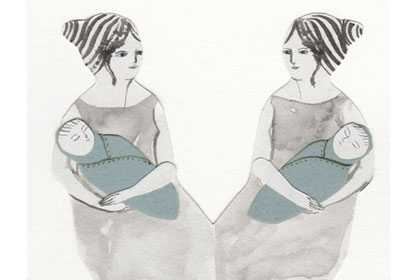The belief that parental behaviour has an important impact on shaping child development is widespread. Entire books, websites, and industries now exist that are focused on this notion. Right from the moment of conception, parents are bombarded with information telling them that their behaviour can have a profound and long-lasting impact on their child. Parents are often given conflicting advice regarding whether or not they should leave their child to “cry out”, how to discipline their children, and how their own behaviour is likely to influence their child’s development.
But what does the evidence say? How important is parental behaviour in determining the kind of person a child becomes?
Theories of parenting propose that parents affect the development of their children in a variety of ways. Many children ‘take after’ their parents in not only their physical appearance, but also their behaviour and personality– they may have the same mannerisms, a similar temperament, or shared values. Such parent-child similarities are often interpreted as evidence that children learn from their parents. Proponents of social learning theory might suggest that this learning occurs via processes of imitation and modeling. Equally, learning can involve the verbal transmission of information from parent to child. For example, children may learn to fear spiders because they have seen their parent react with fear, and/or because their parents refer to spiders using fearful or alarming language.
Parents often seek to purposefully influence their children’s behaviour through the parenting behaviours that they direct toward their child. For example, the punishment and praise of children can be viewed as attempts at conditioning and reinforcement. If children learn to associate certain behaviours with punishment, then they will be motivated to avoid such behaviours. If they associate other behaviours with rewards, then those behaviours may become more common.
Broadly speaking, children and parents correlate with one another in terms of their personality, ability, and mental health. Certain parenting behaviours also correlate with particular behaviours in offspring. For example, parents who monitor their child’s whereabouts and activities tend to have children who exhibit reduced levels of delinquent behaviour during adolescence. Harsh parental discipline is associated with elevated levels of emotional and behavioural problems. Authoritarian parenting (a strict, punitive parenting style, characterised by expectations of conformity and compliance) is associated with offspring conduct problems, whereas a parenting style comprising warmth and positive expressivity is associated with self control and reduced delinquent behaviour in children.
“Parental behaviour can influence child development, but often it is child behaviour that drives parental behaviour.”
But of course, correlation does not equal causation. For example, while it is possible that parent-child associations indicate that parental behaviour influences child development, it is equally possible that child behaviour influences parental behaviour. Longitudinal studies are required to tease these possibilities apart – they give researchers a chance to ask whether parental behaviour predicts future child behaviour, and/or whether child behaviour predicts future parental behaviour. Such studies indicate that effects can operate in both directions – parental behaviour can influence child development, but often it is child behaviour that drives parental behaviour (as in this recent paper from our group).

Like father, like son; the reasons for associations between parent and child behaviours aren’t always clear-cut
Another issue to consider is that external factors may explain associations between parent and child behaviours. That is, parents and children share an environment – environmental factors such as poverty and wealth, neighbourhood characteristics and cultural factors are all shared by family members, and are likely to explain some of the similarities observed between parents’ and children.
The final issue to consider in examining associations between parent and child is the fact that children share 50% of their DNA with each parent. This is crucially important because evidence demonstrates that practically all human traits are, to a greater or lesser extent, heritable. Several decades of research in multiple fields of study all converge on the conclusion that human behaviour is under the influence of genetic factors. Intelligence for example is 60-80% heritable, meaning that approximately 60-80% of variance in human intelligence is attributable to genetic effects. Delinquent behaviour is around 50% heritable. Anxiety tends to be estimated as around 30% heritable.
Given that human traits are influenced by genetic factors, and given that parents and children share 50% of their DNA, it is reasonable to expect that correlations between parent and child behaviour will– at least in part – be attributable to shared genes.
“In most instances we simply do not know if associations between a certain parenting strategy and a particular developmental outcome in children is causal or not.”
So, do intelligent parents have intelligent children because the rearing environment they provide creates clever children? Or is it simply because intelligence is highly heritable? Does parental monitoring truly reduce levels of delinquency? Or are the kinds of parents who monitor their children simply less likely to pass on genetic factors that lead to the development of delinquent behaviours?
To distinguish between genetic transmission and the effects of parenting, specialised research designs are required. These include studies that make use of samples of families either where children are not related to their parents (adoption studies, IVF studies), or where genetic relatedness varies between pairs (children-of-twin studies, cousin comparisons).

Children-of-Twin studies can be used to help distinguish between genetic transmission and the effects of parenting
To date, studies using such research designs are few and far between, so it is difficult to draw firm conclusions. Certainly, it appears that maternal depression is a risk factor for the development of emotional and behavioural problems in children, above and beyond genetic transmission. And we know that parental mental health problems and negative parenting behaviours (e.g. harsh discipline) are bad for children’s wellbeing. However, the fact of the matter is that quality parenting research, that controls for genetic transmission, that controls for shared environments, and that explores the possibility of child-to-parent effects, is incredibly rare. In most instances we simply do not know if associations between a certain parenting strategy and a particular developmental outcome in children is causal or not. And until well-designed research is conducted, any statement regarding the relative merits of one approach to parenting over another is simply speculation.


[…] an earlier post on this blog, Tom detailed these issues specifically in relation to intergenerational associations […]
[…] At the core of these questions is the concept of emotional lability, or the ability to regulate and manage emotions. Clinicians and researchers have, for a couple of decades now, looked at the concept of emotional regulation and its association with depression, but as parents and teachers it is all too easy to label a child or teenager that manages their emotions badly as naughty rather than sad or worried. This can lead to a negative spiral with parents responding in an unsupportive way to such emotional displays, and the situation thus worsening. But the reverse also applies, and supportive parenting (e.g. problem-focussed solutions, such as suggesting where to look for a lost item) is associated with higher emotional regulation abilities in offspring. Of course, unpicking the links between parental behaviours and child outcomes is not straightforward, and requires the use of some innovative methods (as summarised in another post on this blog). […]